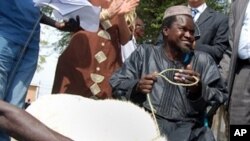The Israeli embassy in Senegal and members of Senegal's Jewish community gave sheep to underprivileged Senegalese families on Tuesday so they can celebrate the Muslim religious holiday of Tabaski this weekend.
Ninety-nine sheep waited for their new owners outside the donation ceremony in Dakar, just four days before Aid el Kebir, or Tabaski, as it is known in Senegal. On that day, Muslims around the world will sacrifice sheep and other animals to commemorate the prophet Abraham's willingness to sacrifice his son Ishmael as an act of obedience to God.
It is an important religious and cultural holiday in Senegal, where almost 95 percent of the population is Muslim. But a sheep or ram can cost between $150 to $600, far beyond the reach of many struggling families.
At the ceremony, Israeli embassy staff, development workers, members of the Senegalese government and religious leaders of all faiths passed out the sheep to needy families on behalf of Israel and Senegal's Jewish community. Ninety-nine sheep were chosen to represent the 99 names for God in Islam.
Fama Ka, a blind mother of two, smiled from under a glimmering gold headscarf as she received the sheep she will share with the 10 members of her household on Saturday.
She said they are Muslims and so receiving a sheep like this allows them to fulfill their religious duty.
Ka said Muslims and Jews share the story of Abraham, and that the gift reminds her of the solidarity between the two faiths.
Israel's Ambassador to Senegal, Gideon Behar, says that was the idea for organizing the event. He says Tabaski is very important holiday in Senegal that is about forgiveness, togetherness and generosity, making it a natural time to celebrate the similarities between Islam and Judaism, and seek new avenues of cooperation.
"It's the time when people sit together, share rams together, eat together. It is a time to be together with neighbors and family," he said. "So we wanted to do a symbolic gesture between Israel and Senegal, between the Jewish community and the Muslim community."
Working with local partners, the Israeli embassy collected more than $13,000 in donations from the Israeli government, the Jewish community in Senegal and other Senegalese benefactors to buy the sheep.
Momar Talla Kane is the president of CONGAD, a network of Senegalese development organizations that coordinated the purchase and distribution of the sheep.
He says that 99 sheep might seem like a small gesture, when perhaps as many as 10 million Senegalese need them. But, he says, people give what they can and that it is the generosity the sheep symbolize that is important. The gesture, he says, means that 99 poor families will have sheep for Tabaski, and that is a step in the right direction.
Kane said that they tried to choose the neediest families from the various organizations, with at least one third of the sheep going to handicapped members and one third going to families outside of the capital, Dakar.





